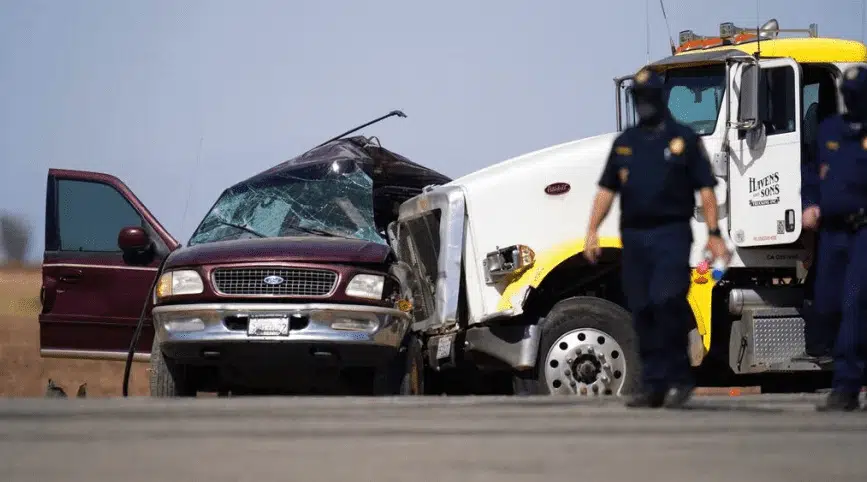Many of us have heard reports of massive truck accident compensation awards. From comedian Tracy Morgan’s reported $90 million truck accident settlement to a $1 billion verdict awarded in a truck accident lawsuit against two trucking companies in Florida, there is no shortage of examples.
People often wonder why truck accident compensation is so much higher than in car accident claims. The answer largely boils down to two factors:
· More serious injuries that result in larger losses
· Trucking companies carry liability insurance policies with higher coverage limits.
Semi Truck Accident Compensation: Serious Injuries and Larger Losses
Truck accident settlements typically involve serious and potentially fatal injuries. But it is often pedestrians or other motorists that are the victims. In 2019, 4,119 people died in truck crashes in the U.S. Truck occupant deaths accounted for 16% of the total compared to 67% of passenger vehicle occupants.
Size, weight, and height are the main contributors to truck accidents being more dangerous than car accidents A fully loaded tractor-trailer can weigh upwards of 80,000 pounds. The average passenger vehicle, however, weighs just 4,000 pounds. The average 18-wheeler ranges between 70 and 80 feet long, while the average car is just 10 to 14 feet long.
There is also a significant height difference. This can cause a passenger car to slide underneath the truck, resulting in severe and often fatal injuries. As a general rule, the more serious a victim’s injuries are the larger his or her compensation will be. Truck accident compensation will typically include both economic and non-economic damages. Economic damages consist of the victim’s past, present, and future medical expenses, as well as lost wages and reduced earning capacity.
Non-economic damages include pain and suffering and mental anguish. Truck accidents can be traumatic for victims. And serious injuries can result in a long recovery process and significantly reduce the victim’s quality of life. All these factors contribute to larger semi truck accident compensation awards.
Some common types of truck accident injuries include:
· Soft tissue injuries and whiplash. When a large truck strikes a passenger vehicle, the sheer force of the impact can cause the driver and/or passengers to be thrown about or ejected from the vehicle. The extreme forces can cause whiplash, sprains, abrasions, muscle tears, and/or tendon and ligament damage.
· Burns. Large trucks transporting flammable materials are particularly dangerous. The material can explode or leak from the tank and ignite. Steam or hot water escaping from the truck or tank can also cause serious burns.
· Internal injuries. The force of the impact or an object that penetrates the victim can cause potentially life-threatening internal injuries. For example, internal bleeding ruptured organs, and/or fractured ribs.
· Head and brain injuries. A sudden jolt or blow to the head can cause a traumatic brain injury (TBI). TBIs vary greatly in severity, from a concussion to permanent physical and cognitive impairment, or even death.
· Spine injuries. A truck accident can cause significant back injuries. These can range from a ruptured disc to a break or tear of the spinal cord. The latter can cause permanent paralysis.
· Mental anguish. The trauma of a truck accident can cause the victim significant psychological harm. For example, depression, anxiety, and post-traumatic stress disorder (PTSD).
Truck Accident Compensation and Higher Liability Insurance Limits
The trucking industry is heavily regulated. These regulations include requirements to carry minimum liability insurance. Liability insurance consists of bodily injury and property damage coverage. Bodily injury coverage pays for the medical expenses component of a truck accident settlement. This includes costs incurred by other motorists as well as pedestrians. Property damage covers the costs to repair or replace other people’s property that is damaged in the accident.
The Federal Motor Carrier Safety Administration (FMCSA) specifies the minimum amount of liability insurance that trucking companies must carry for interstate travel. The FMCSA bases the minimum amount of liability coverage on the type of freight that the trucking company transports. The minimum liability coverage amounts are:
· $300,000 minimum liability insurance for non-hazardous freight in vehicles weighing less than 10,001 pounds.
· $750,000 minimum liability insurance for non-hazardous freight in vehicles over 10,001 pounds.
· $1,000,000 minimum liability insurance for oil moved by for-hire and private carriers.
· $5,000,000 minimum liability insurance for other hazardous material moved by for-hire and private carriers.
These minimums exceed car insurance liability coverage limits by several times. Insurance companies will often try to settle semi truck accident claims rather than risking the victim being awarded a large verdict in a truck accident lawsuit. For this reason, many truck accident claims settle for less than the minimum coverage amounts.
Many trucking companies choose to buy higher coverage limits. This protects them from liability in the event of an accident involving a serious injury or death. Moreover, motorists in car accident cases tend to be individuals with limited resources and assets. Trucking companies are often large and can afford to pay damage awards that exceed their insurance coverage. For these reasons, victims can usually receive more in truck accident compensation than they do in a car accident case.
Semi Truck Accident Claims vs. Car Accident Claims
The following are several examples of compensation awarded in accidents involving similar fact patterns. However, in each example, one accident involves a truck and the other passenger vehicles.
Example #1: Head-On Collision With a Truck vs. With a Car
Semi Truck Accident Settlement
The victim was traveling northbound on a two-lane road. A commercial truck was heading southbound and swerved into the victim’s lane striking her vehicle head-on. The victim suffered severe injuries. They included two broken legs and several fractures. She spent several months in the hospital and required multiple surgeries. Following discharge, she attended several months of physical therapy. The parties reached a truck accident settlement of $1,850,000.
Car Accident Settlement
The victim was traveling northbound on a highway. The other driver was traveling southbound when his vehicle crossed the median and struck the victim’s car head-on. The victim did not report any injuries at the scene. A few days later she began to experience headaches and nausea. She went to her doctor and was diagnosed with a concussion from the car accident. The victim’s medical bills totaled $10,000. The case settled for $70,000, approximately 7x her medical bills.
Difference In Compensation = In the instance of a head on collision, $1,780,000 more compensation was due for a head on truck accident settlement than for a car accident settlement with similar circumstances.
Example #2 – Rear-End Collision With a Truck vs. With a Car
Truck Accident Settlement
The victim was stopped at an intersection. A tractor-trailer failed to come to a stop and rear-ended his vehicle. The victim suffered a back injury and required lumbar fusion surgery. The parties are unable to reach a truck accident settlement. The victim hires a truck accident attorney and files a semi truck accident lawsuit. At trial, the victim proves that the truck driver was negligent. The jury awards the victim and his family members a total of $3.5 million. The verdict in the truck accident case included damages for past medical bills, future medical bills, lost earnings, reduced earning capacity, and pain and suffering.
Car Accident Settlement
The victim was merging onto the service road from the off-ramp of a highway. Her vehicle was rear-ended by another car that failed to yield. The victim did not require medical treatment at the scene. But she decided to stop at the emergency room on the way home to get checked out. She was diagnosed with a back strain. The other driver’s insurance company refused to settle, arguing that the injury was preexisting. The victim filed a truck accident lawsuit. Before the case went to trial, the parties reached a car accident settlement of $300,000.
Difference in Compensation = In a rear end collision with a truck, the settlement amount was $3,200,000 higher than in a similar rear end collision settlement when 2 cars were involved.
Example #3 – T-Bone Accident With a Truck vs. With a Car
Truck Accident Lawsuit
The victim drove her car into an intersection with a two-way stop sign. A semi-truck that failed to stop at the stop sign struck the side of her vehicle. The victim broke her leg and ankle. She required numerous surgeries but still experience chronic pain and an ankle deformity. The injury left her unable to return to the same job that she had before the accident. The parties were unable to reach a truck accident settlement. The victim filed a lawsuit. At trial, the victim proved that the big rig driver was negligent since he failed to yield the right of way. The jury awarded the victim $1.6 million. This amount included past medical expenses and lost wages, as well as lost future income.
Car Accident Lawsuit
The victim was traveling northbound on a two-lane road. Another driver was traveling eastbound and struck the victim’s driver’s side door at an uncontrolled intersection. The victim suffered whiplash and a shoulder injury. Her shoulder injury required two surgeries. The defendant refused to settle. The victim filed a truck accident lawsuit. At trial, the victim showed that the defendant was negligent since he failed to yield the right of way. The victim was awarded $133,000. This amount included medical expenses and pain and suffering.
Difference in Compensation = In a semi truck accident lawsuit where a truck t-boned a car, the compensation was $1,467,000 greater than a similar t bone car accident lawsuit.
As the examples above illustrate, truck accident lawsuits and settlements are often larger than car on car accidents with similar circumstances. Because of the sheer size and speed, different rules around commercial vehicle accidents and insurance, and generally much more serious injuries, truck accidents are inherently more complex, but also have the potential for much larger payouts.
If you or a loved one has been injured in a truck accident, chances are there are injuries and a complex insurance policy to understand. Many semi truck accident lawsuits and settlements are larger than a standard motor vehicle accident, but they are also a lot more complicated. Finding a personal injury law firm that’s familiar with truck accident cases is a good first step, and most offer a free consultation to determine the viability of a personal injury case.


